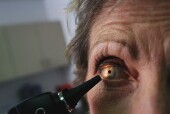- Could Your Grocery Store Meat Be Causing Recurring UTIs?
- Are You Making This Expensive Thermostat Error This Winter?
- Recognizing the Signs of Hypothyroidism
- 10 Strategies to Overcome Insomnia
- Could Artificial Sweeteners Be Aging the Brain Faster?
- Techniques for Soothing Your Nervous System
- Does the Water in Your House Smell Funny? Here’s Why
- Can a Daily Dose of Apple Cider Vinegar Actually Aid Weight Loss?
- 6 Health Beverages That Can Actually Spike Your Blood Sugar
- Treatment Options for Social Anxiety Disorder
Eye Tests Might Help ID Alzheimer’s, Studies Suggest


Eye tests could be used to identify people in the early stages of Alzheimer’s disease, two new studies suggest.
In one study, early results from 40 participants who used a certain eye test found a significant association between levels of beta-amyloid plaques in the retina of the eye and levels of the plaques in the brain. Beta-amyloid plaques in the brain are associated with Alzheimer’s disease.
This type of eye test could be used in conjunction with the brain scans and clinical tests currently relied on to diagnose Alzheimer’s, study author Shaun Frost, of the Commonwealth Scientific and Industrial Research Organization in Australia, said in a news release from the Alzheimer’s Association.
The eye test could also be used to monitor the progression of Alzheimer’s and a patient’s response to treatment, Frost added.
The preliminary results were scheduled for release at the annual meeting of the Alzheimer’s Association in Copenhagen, Denmark, which started Sunday. The full study, involving 200 participants, is expected to be completed later this year.
Another study presented at the meeting utilized a different type of eye test. It found a strong link between levels of beta-amyloid plaques in the lens of the eye and in the brain.
“There is a critical need for a fast, dependable, low-cost and readily available test for the early diagnosis and management of Alzheimer’s disease,” Dr. Pierre Tariot, director of the Banner Alzheimer’s Institute in Phoenix, Ariz., said in an Alzheimer’s Association news release. Tariot was a principal investigator in the study.
Research presented at meetings is considered preliminary until published in a peer-reviewed medical journal.
More information
The U.S. National Library of Medicine has more about Alzheimer’s disease.
Source: HealthDay
Copyright © 2026 HealthDay. All rights reserved.










